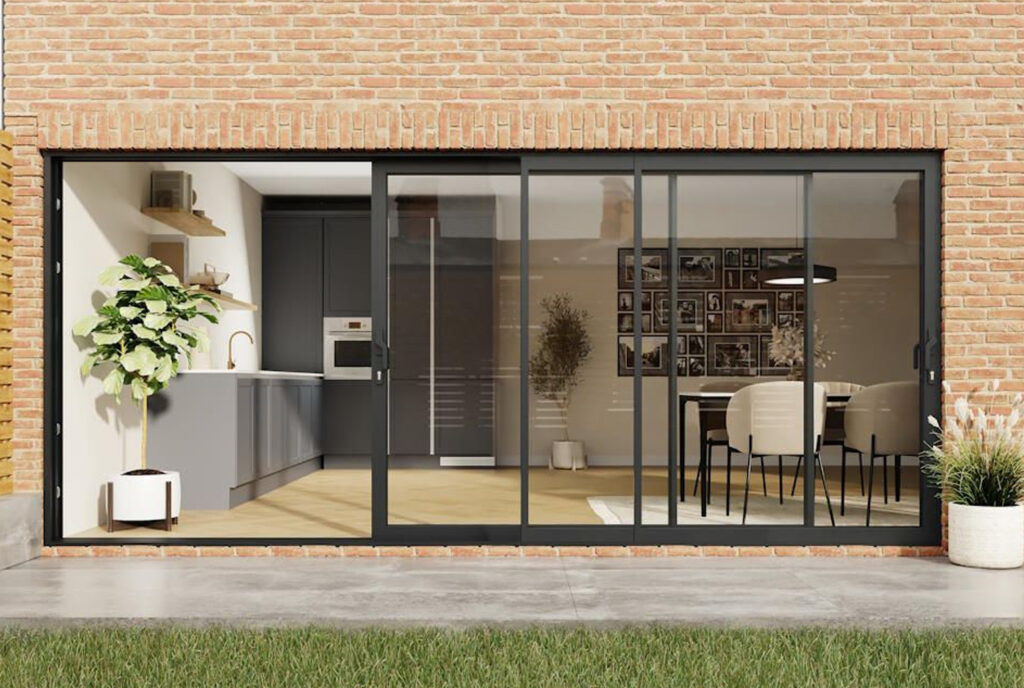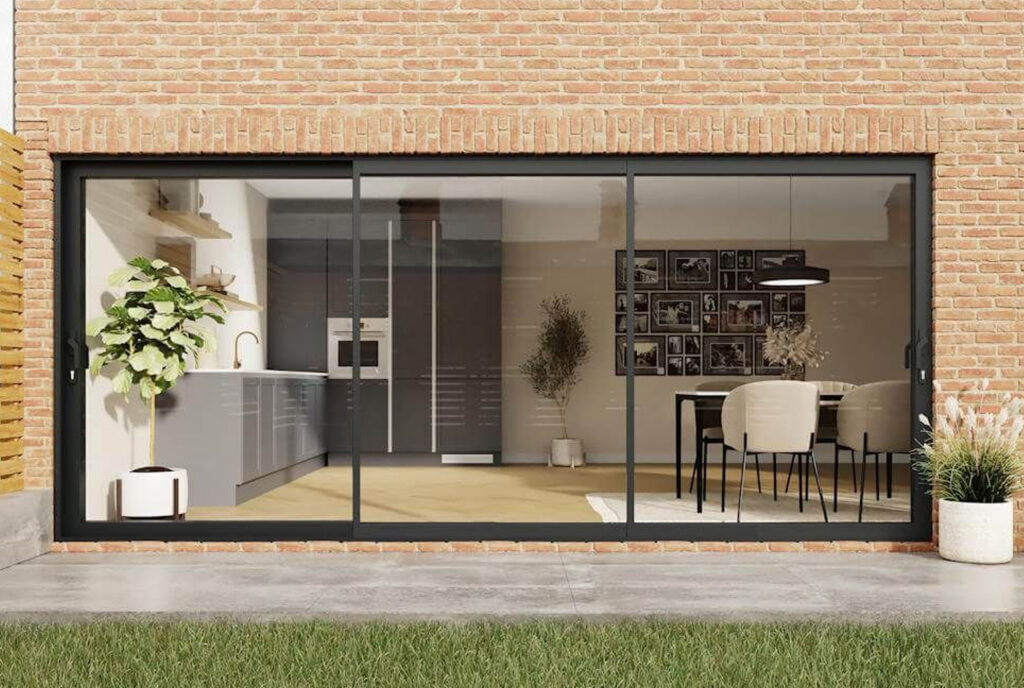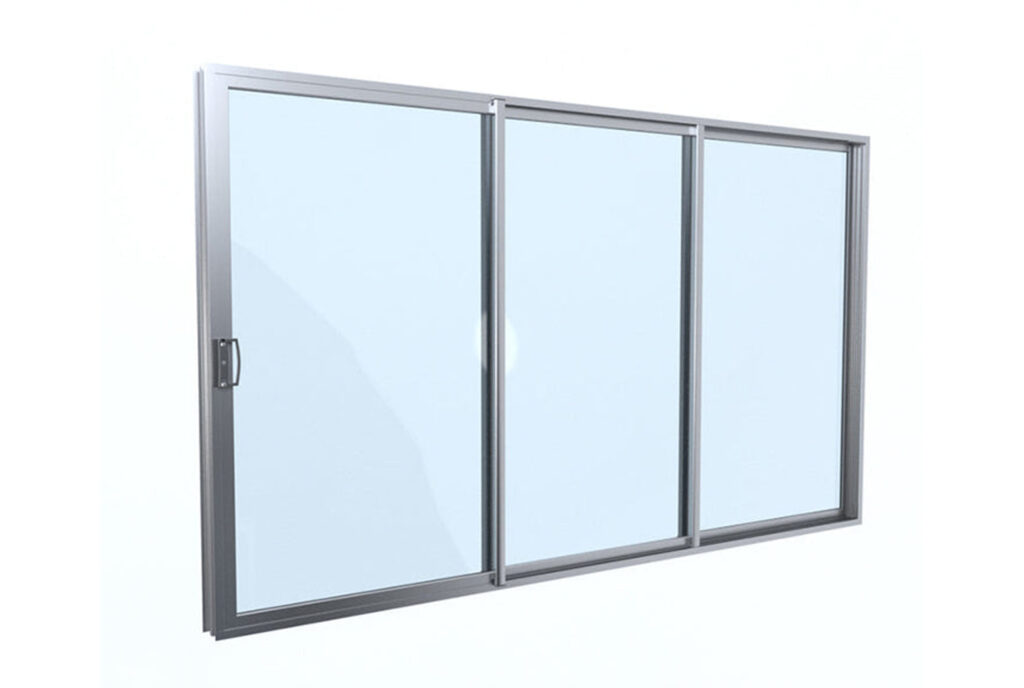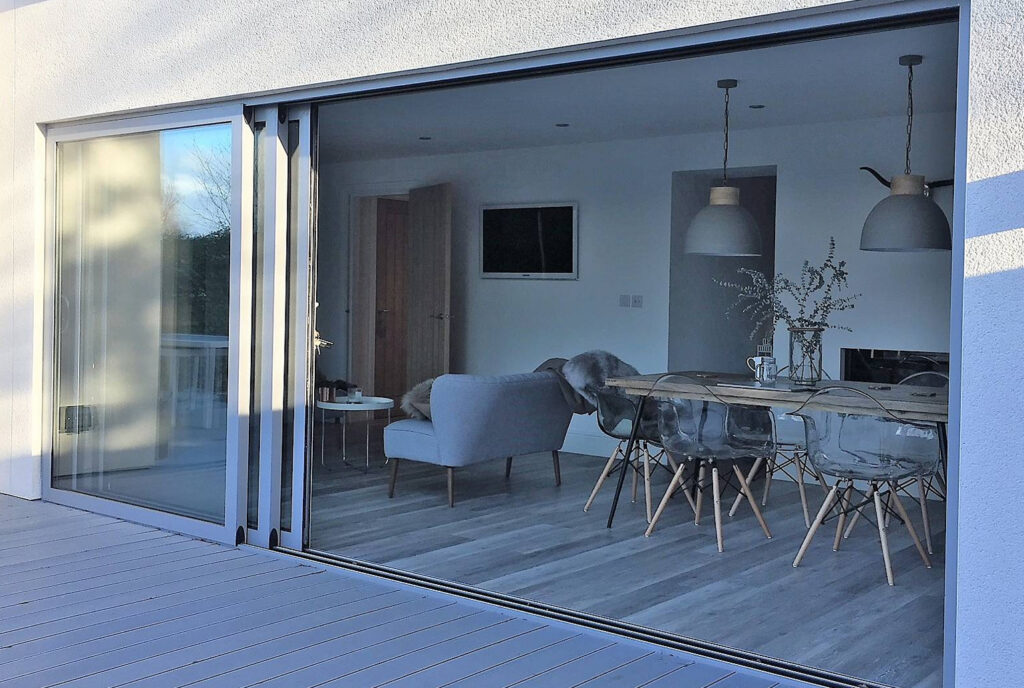Richocean Is China’s Trusted Supplier Of
Windows And Doors Manufacturer
In modern home design, tri-fold sliding doors are captivating more and more households with their unique charm. This innovative door design not only perfectly addresses the spatial limitations of traditional sliding doors but also, with its elegant opening mechanism and flexible space-division capabilities, becomes the highlight of contemporary home design.
Tri-fold sliding doors feature a three-panel linkage design, achieving smooth movement through precise track systems and linkage mechanisms. Compared to traditional sliding doors, they can open up to two-thirds of the doorway width, significantly improving space utilization. For example, in a 4-meter-wide doorway, tri-fold sliding doors can open approximately 2.7 meters, while traditional sliding doors only open 2 meters—a difference particularly noticeable in small apartments.
In practical applications, tri-fold sliding doors demonstrate remarkable space-transforming capabilities. In an 80-square-meter loft apartment, using tri-fold sliding doors to separate the living room and bedroom ensures spatial independence while allowing the space to be fully opened when needed, creating a seamless open area. This flexible spatial transformation elevates the living experience.
From a user experience perspective, the advantages of tri-fold sliding doors are evident. Their smooth operation, quiet design, and elegant appearance all contribute to a high-quality living experience. Surveys show that user satisfaction with tri-fold sliding doors reaches 95%, far exceeding the 75% satisfaction rate for traditional sliding doors.
The material performance of tri-fold sliding doors is the foundation of their excellence. High-quality aluminum alloy materials, known for their strength, corrosion resistance, and lightweight properties, ensure the stability and durability of the doors. Common material thicknesses range from 1.4mm to 2.0mm, with premium products reaching up to 2.5mm, guaranteeing robustness.
In terms of thermal insulation, tri-fold sliding doors use thermal break aluminum designs to effectively block heat transfer and enhance energy efficiency. Their U-value (thermal transmittance) can be as low as 1.8W/(m²·K), far superior to the 6.0W/(m²·K) of ordinary aluminum alloys. This design significantly improves indoor comfort in both cold and hot regions.
For sound insulation, tri-fold sliding doors achieve excellent performance through multi-layer sealing and insulated glass. Their sound insulation index can exceed 35dB, effectively blocking external noise and creating a quiet living environment. This feature is particularly important for homes facing noisy streets or environments.
Glass is a crucial component of tri-fold sliding doors, and its selection directly impacts the door's aesthetics and functionality. Common glass types include tempered glass, laminated glass, and Low-E glass. Tempered glass offers high strength and safety, shattering into small, harmless pieces if broken.
Laminated glass, with a PVB interlayer, enhances safety and sound insulation. Low-E glass, coated to reflect infrared rays, improves thermal insulation, making it ideal for energy-efficient buildings.
For glass thickness, 5mm to 8mm tempered glass is generally recommended, with premium products using 10mm or thicker glass. For higher safety and sound insulation, 6mm+6mm laminated or insulated glass is preferred.


The frame is the skeleton of tri-fold sliding doors, and its material and design directly affect the door's stability and aesthetics. Common frame materials include aluminum alloy, stainless steel, and solid wood. Aluminum alloy frames are the most popular due to their lightweight, durability, and ease of processing.
In frame design, narrow frames are becoming a trend. By optimizing structural design, frame widths can be reduced to under 20mm, ensuring strength while enhancing visual appeal. This design makes tri-fold sliding doors appear more modern and sleek.
For personalized preferences, custom frame colors are available. Using powder coating or electrophoretic coating, frames can be finished in various colors, from classic black and white to personalized champagne gold and rose gold, catering to different interior styles.
Smart technology is a key direction for tri-fold sliding doors. With intelligent sensing systems, the doors can automatically recognize user needs and open accordingly. Integration with smart home systems makes tri-fold sliding doors an essential part of the smart home ecosystem.
In terms of safety, tri-fold sliding doors feature multiple protective designs, including anti-pinch mechanisms, automatic sensors, and high-strength materials, ensuring user safety. These features are especially important for households with elderly or children.
Looking ahead, tri-fold sliding doors will evolve toward greater intelligence, sustainability, and personalization. New materials and technologies will further enhance their performance and aesthetics. By 2025, the penetration rate of tri-fold sliding doors in high-end residential markets is expected to reach 40%.


Foshan, China, as a global hub for the door and window industry, has become a major production base for tri-fold sliding doors, thanks to its complete industrial chain and advanced manufacturing technology. Foshan-made tri-fold sliding doors not only offer excellent quality but also significant price advantages.
In Foshan, a standard-sized tri-fold sliding door typically costs between 2,000 and 5,000 RMB, depending on factors such as material thickness, glass type, and hardware accessories. Compared to imported brands, which often cost tens of thousands, Foshan-made products stand out for their cost-effectiveness.
At the same time, Foshan-made tri-fold sliding doors match international brands in quality. By adopting advanced production equipment and strict quality control systems, Foshan manufacturers produce high-quality products that meet international standards. Many Foshan brands have obtained ISO9001 quality management system certification and CE certification, with products exported to regions such as Europe, America, and Southeast Asia.
Tri-fold sliding doors are not just a door design but a reflection of a lifestyle. They represent modern aspirations for space, aesthetics, and intelligence, marking a revolution in home design philosophy. With technological advancements and evolving design concepts, tri-fold sliding doors will undoubtedly play an increasingly important role in future home design, creating better living experiences. Meanwhile, Foshan-made tri-fold sliding doors, with their exceptional quality and affordable prices, are gaining growing recognition and popularity in the global market.
Related Articles